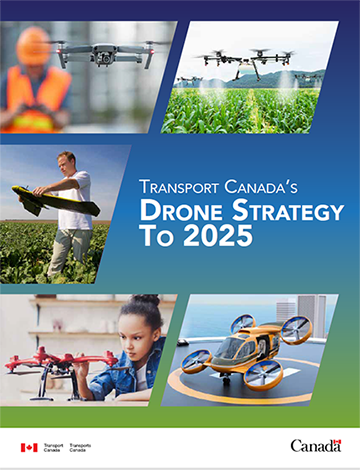Drones are a new generation of aircraft in a growing part of the aviation industry. As drones become more commonplace, it has become clear they are a game-changing technology not only within the transportation network but for society at large. Drones are modernizing the way industries work, improving people’s lives, and providing public benefits to communities. Most recently, drones have been used to conduct deliveries to remote communities and have helped respond to COVID-19.
Our vision is for drone operations to be safely and securely integrated into Canadian skies as part of a modern national civil aviation system. Since 2015, we have been working towards this vision by collaborating with industry and other partners on Research & Development (R&D) activities, pilot projects to test technologies, and developing regulations and standards to ensure drones are used safely.
Through this work, we identified challenges and opportunities that will inform five key priorities:
Supporting Innovation Through Safety Regulations – Our top priority is developing regulations for lower-risk Beyond Visual Line Of Sight (BVLOS) operations in rural and remote areas. We will also be conducting technology R&D, testing, and authorizing pilot projects that will inform our policies and rules for medium-risk drone operations.
Managing Drone Traffic – Establishing a drone traffic management system in Canada is a long-term effort. Building on the first phase of traffic management trials launched in 2020, in the medium-term we will launch additional operational trials. This includes exploring options to remotely identify drones to ensure accountability of drone operators.
Understanding and Addressing Drone Security Risks – We are at the early stages of collectively understanding the security threats and risks posed by drones at airports and other critical infrastructure. Our activities will first focus on the aviation sector and include:
-
collaborating with stakeholders to clarify security responsibilities
-
exploring counter-drone technologies to effectively address unauthorized drone incursions at airports
-
introducing security regulations and standards to detect and remove drones
Supporting Economic Growth – Unlocking the economic potential of the drone sector depends on continued rapid progress in technology development and testing. We will continue to pursue partnerships to advance drone R&D both in Canada and globally, and will prioritize those projects relevant to the Canadian environment. Our activities include:
-
developing strategies to enable cutting-edge drone technologies prepare for international markets
-
working with stakeholders to develop an economic strategy to modernize the current framework, including air carrier licensing rules
-
supporting the growth of the drone sector in Canada
Increasing Public Trust in Drones – Building public trust in drone technology is essential to success. This will involve:
-
increasing our own understanding of public perception and acceptance of drones
-
continuing to communicate with the public and encouraging engagement by Indigenous communities
-
work with different levels of government to plan for urban operations
-
expand partnerships with the law enforcement
Transport Canada’s Drone Strategy to 2025 (PDF, 711 KB)
